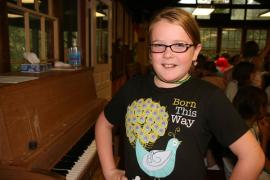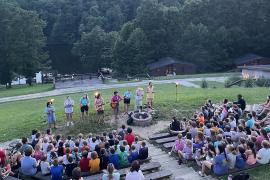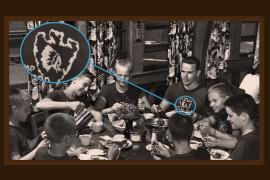Content note: Statistics on suicide attempts among LGBTQ youth
When people worry about what might happen, the fears we carry can get in the way of us doing really good things. I call that “putting monsters under the bed.” Know what the antidote to monsters under the bed is? It’s looking under the bed.
When camps work to integrate 2SLGBTQIA+ inclusive policies and practices, they voice the same fears and concerns articulated all over the country. Camps fear they’ll “lose” families, funding, board support. Camps worry they’ll “do it wrong” and cause harm or underprepare staff or encourage toxic behavior or politicize their culture.
In Transplaining for Camps’s 2022 survey of over 300 camp professionals, respondents named pronoun usage as the “inclusive practice” that was most often the topic of pushback from caregivers. You should also know that 0 percent of survey respondents reported an “unmanageable amount” of backlash from caregivers due to instituting inclusive practices.1 Yes, any level of backlash is something to factor in when you’re adopting inclusive practices — but here’s a little more perspective.
The Trevor Project’s 2022 National Survey on LGBTQ Youth Mental Health found that 45 percent of LGBTQ youth seriously considered attempting suicide in the past year, including more than half of transgender and nonbinary youth (The Trevor Project, n.d.). We also know from their data that when trans* and nonbinary youths’ pronouns are respected by all or most people in their lives, their rate of attempted suicide decreases by up to half (The Trevor Project, 2023). In terms of negative outcomes, we can’t tell the future — but we can tell the truth. The truth is that the reported pushback camps get from respecting pronouns pales in comparison to the potential life-saving impact it has on campers.
We’re living in a cultural moment where an unprecedented slate of legislation against trans* and nonbinary youth has caused kids and families to feel a dwindling sense of safety. Camps have the ability to meet this moment with an offer of refuge — but you need to know how and what (realistically) might happen if you do. You can start by asking: Which caregivers influence your practices more? The families navigating very real (documented, evidenced-based) threats to safety, or the ones putting monsters under the bed?
It is vital that we understand the range of experiences and needs of camps integrating 2SLGBTQIA+ inclusive practices — for other camps and for folks whose mission is to support them in their efforts. One way we can do that is to collect accurate data reflecting camps’ realities. That’s why Transplaining for Camps launched an annual survey for camp professionals to share their experiences.
The findings of this survey will be reported out via annual webinars, in conference presentations, and in training content. Responses are entirely anonymous and data will be shared with anyone who requests it. Participation is free, takes less than 10 minutes, and is open to anyone who worked at or for a camp in 2023 — from counselors through executive leadership.
The more information we have about inclusive practices, the better we can be at responding to fear-based backlash, at championing evidence-based practices, and telling the true story of 2SLGBTQIA+ inclusion in camps.
Responses gathered by September 22 will be included in the Transplaining for Camps September 26 “Lessons Learned” webinar.
1 Additional selected survey results: 84.6 percent of respondents to our 2022 2SLGBTQIA+ Inclusive Practices at Camp Survey reported “little to no” backlash from funders.
References
The Trevor Project. (n.d.). 2022 national survey on LGBTQ youth mental health. thetrevorproject.org/survey-2022/assets/static/trevor01_2022survey_final.pdf
The Trevor Project. (2023). 2023 U.S. national survey on the mental health of LGBTQ young people. thetrevorproject.org/survey-2023/assets/static/05_TREVOR05_2023survey.pdf
Al Murray (they/them) started their career as a camp professional 20 years ago. Al has since worked at multiple YMCA and Girl Scouts associations, LGBTQ+ youth-serving organizations, and advocacy groups across the South. They have served at senior levels in youth programming and LGBTQ+ advocacy and organizational development — most recently at the Campaign for Southern Equality and currently as director of Transplaining for Camps. The only things they love more than pizza are their adorable wife Rebecca and twin toddlers Sam and Starr.
Photo courtesy of Al Murray




